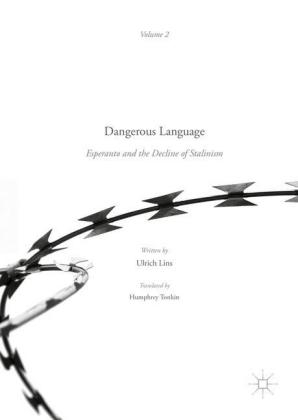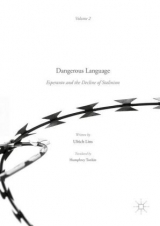Dangerous Language — Esperanto and the Decline of Stalinism
Palgrave (Verlag)
978-1-352-00019-1 (ISBN)
Ulrich Lins received his doctorate at the University of Cologne, Germany, with a dissertation on Japanese nationalism (published in 1976). For thirty years he worked for DAAD, the German Academic Exchange Service in its headquarters in Bonn, and served two tours of duty as head of its office in Tokyo. He has edited numbers of books in German and Japanese on German-Japanese relations and on Germany following reunion. The present volume, written originally in Esperanto, has appeared in German, Italian, Japanese, Korean, Russian, and Lithuanian translations. Humphrey Tonkin is President Emeritus of the University of Hartford, USA, where he served as University Professor of Humanities. He studied English and comparative literature at Cambridge and Harvard (Ph.D. 1966) and has written widely on literary topics and on international education and language policy. He has published numbers of translations from English to Esperanto and from Esperanto to English.
- PART I: THE DEATH OF ESPERANTO IN THE SOVIET UNION.- Chapter 1: The events of 1937-38.- Chapter 2: Esperantists in the Great Purge.- Chapter 3: The emergence of Soviet patriotism.- Chapter 4: International correspondence.- Chapter 5: Silence descends.- PART II: ESPERANTO REBORN.- Chapter 6: After the Second World War: The Great Silence in Eastern Europe.- Chapter 7: Stalin against Marr.- Chapter 8: The needs of the present.- Chapter 9: Revival of the movement.- Chapter 10: Eastern Europe: progress and problems.- Chapter 11: The Soviet Union: between hope and doubt.- PART III: CONCLUSION.- Chapter 12: Conclusion: Dangerous Language or Language of Hope?.
| Erscheinungsdatum | 03.03.2017 |
|---|---|
| Übersetzer | Humphrey Tonkin |
| Zusatzinfo | 2 Illustrations, color; 20 Illustrations, black and white; XIX, 198 p. 22 illus., 2 illus. in color. |
| Verlagsort | Basingstoke |
| Sprache | englisch |
| Maße | 148 x 210 mm |
| Themenwelt | Geisteswissenschaften ► Geschichte ► Regional- / Ländergeschichte |
| Geisteswissenschaften ► Sprach- / Literaturwissenschaft ► Sprachwissenschaft | |
| Sozialwissenschaften ► Politik / Verwaltung ► Politische Systeme | |
| Sozialwissenschaften ► Politik / Verwaltung ► Politische Theorie | |
| Schlagworte | 'Lauschangriff' • .NET • 'N Sync (Pop-Gruppe) • 'Unter den Linden' (Friedhof) Reutlingen |
| ISBN-10 | 1-352-00019-9 / 1352000199 |
| ISBN-13 | 978-1-352-00019-1 / 9781352000191 |
| Zustand | Neuware |
| Haben Sie eine Frage zum Produkt? |
aus dem Bereich




